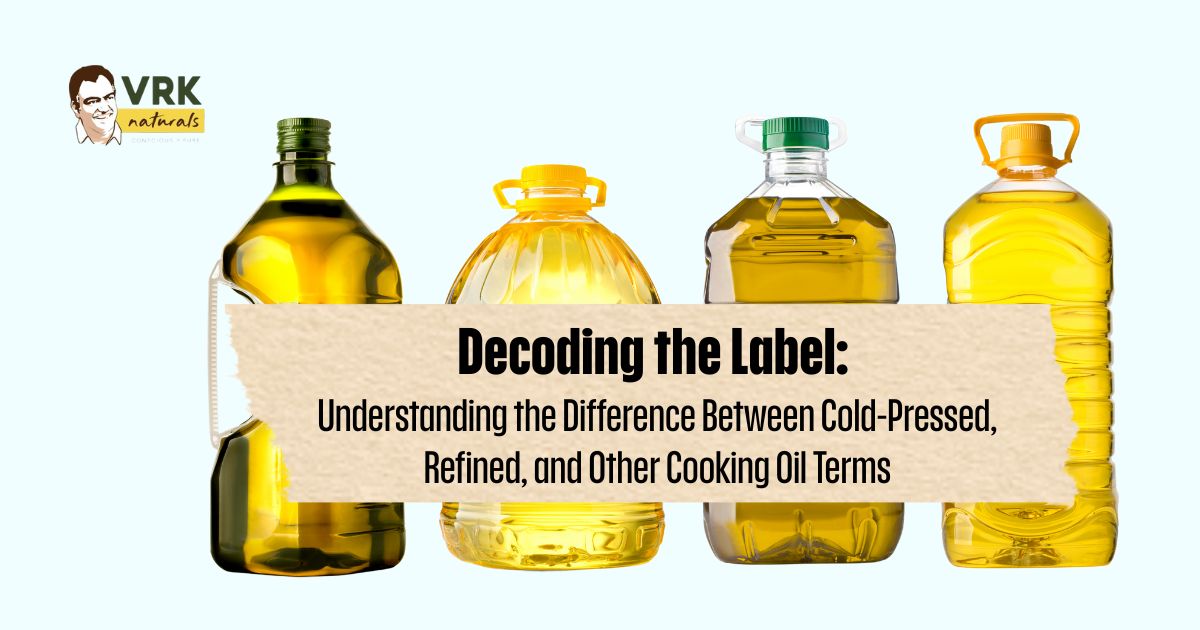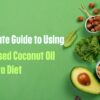Wandering down the cooking oil aisle can feel like navigating a foreign language. Terms like “cold-pressed,” “refined,” “virgin,” and “expeller-pressed” jump out from the labels, often leaving us wondering: what do they actually mean, and more importantly, which oil is the best choice for our health and cooking needs? At VRK Naturals, we believe in empowering you with knowledge so you can make informed decisions. Let’s break down the common terminology you’ll find on cooking oil labels and shed light on the crucial differences.
The Foundation: How Oils Are Extracted
The journey of a cooking oil begins with extracting it from its source – be it seeds, nuts, or fruits. The method of extraction significantly impacts the oil’s final properties, including its nutritional value, flavor, aroma, and smoke point. Here are some key terms you’ll encounter:
1. Cold-Pressed:
This is the method we proudly employ at VRK Naturals and SWA. As the name suggests, cold pressing involves mechanically crushing the oil-bearing material (like groundnuts or sesame seeds) at a low temperature. The key here is minimizing heat generation during the process. Typically, the temperature doesn’t exceed 120°F (49°C).
- What it means: Minimal heat preserves the oil’s natural flavor, aroma, color, and, most importantly, its valuable nutrients, including vitamins, antioxidants, and essential fatty acids. No chemical solvents are used in this process.
- Why it matters: Cold-pressed oils are considered a healthier choice as they retain more of their inherent goodness. They often have a richer, more authentic taste reflecting the original source.
2. Refined:
Refining is a more intensive process used to extract oil, often from sources with lower oil content or to achieve a more neutral flavor and higher smoke point. It typically involves several steps:
-
Solvent Extraction: Chemical solvents (like hexane) are used to extract the maximum amount of oil from the raw material.
-
Degumming: Removes gums and phospholipids.
-
Neutralization: Removes free fatty acids to prevent rancidity.
-
Bleaching: Removes color pigments.
-
Deodorization: Removes unwanted odors and flavors using high temperatures and steam.
-
What it means: Refined oils are typically more stable at higher temperatures and have a neutral flavor and aroma, making them suitable for a wider range of cooking applications, especially high-heat cooking like deep-frying. However, the refining process can strip away some of the natural nutrients and antioxidants.
-
Why it matters: While refined oils have their place, they are generally less nutrient-dense and involve chemical processing.
3. Expeller-Pressed:
This is a mechanical extraction method that uses pressure to squeeze the oil out of the seeds or nuts. While it doesn’t necessarily involve chemical solvents, it can generate some heat during the pressing process.
- What it means: Expeller-pressed oils are generally considered a better option than solvent-extracted oils as they avoid the use of chemicals. The level of heat generated can vary depending on the equipment and process.
- Why it matters: Look for “cold-pressed expeller-pressed” to ensure minimal heat was used, maximizing nutrient retention.
4. Virgin:
People most commonly associate this term with olive and coconut oil. It indicates that producers extract the oil using mechanical means (like pressing) without using chemical solvents and without undergoing any refining processes. However, they do use centrifugation to separate debris from the oil.
- What it means: Similar to cold-pressed, “virgin” signifies a minimally processed oil but might not retain it original nutrients bcause of the centrifugation.
- Why it matters: Choosing “virgin” ensures you’re less processed oil compared to refined oils.
5. Pure:
The term “pure” on an oil label can be misleading. It often simply means the oil is 100% of the named oil type (e.g., 100% olive oil) but doesn’t necessarily indicate the extraction method or level of processing. It could be a blend of refined and virgin oils.
- What it means: Doesn’t provide much information about the quality or processing of the oil.
- Why it matters: Don’t rely solely on the term “pure” to determine the oil’s health benefits or processing method. Look for more specific terms like “cold-pressed”
Decoding the Label: What to Look For
When choosing a cooking oil, pay attention to the following:
- Extraction Method: Prioritize “cold-pressed” for maximum nutrient retention and natural flavor, especially for lower to medium-heat cooking and finishing.
- Ingredients: The label should ideally list only the oil from the specific source (e.g., 100% cold-pressed groundnut oil). Avoid oils with added preservatives or artificial ingredients.
- Intended Use: Consider the smoke point of the oil based on your cooking method. Refined oils generally have higher smoke points suitable for frying, while cold-pressed oils are often better for sautéing, stir-frying, and using as finishing oils.
- Your Health Needs: If you’re looking for specific health benefits associated with certain oils (like the antioxidants in cold-pressed oils or the MCTs in virgin coconut oil), choose accordingly.
Our Commitment to Cold-Pressed Quality
At VRK Naturals and Swa, we are passionate about the traditional art of wood cold pressing. We believe this gentle method is the best way to extract the pure essence and natural goodness of our chosen oilseeds. When you choose VRK Naturals, you’re choosing oils that are:
- Truly Cold-Pressed: Extracted using traditional wooden expellers, ensuring minimal heat and maximum nutrient retention.
- Unrefined: Free from chemical solvents, bleaching, and deodorization processes.
- Flavorful and Aromatic: Retaining the authentic taste and aroma of the natural source.
- Nutrient-Rich: Packed with the natural vitamins, antioxidants, and healthy fats present in the oilseeds.
Conclusion:
Understanding the terminology on cooking oil labels empowers you to make healthier and more informed choices for your kitchen. By prioritizing minimally processed oils like cold-pressed and virgin varieties, you can enjoy not only delicious flavors but also the inherent nutritional benefits that nature intended. Choose VRK Naturals and experience the difference that traditional, gentle extraction makes.







